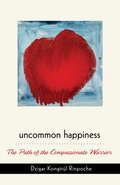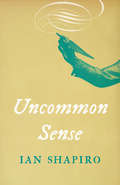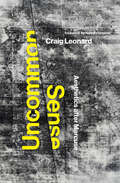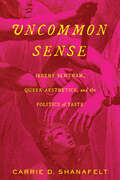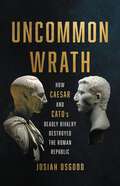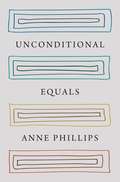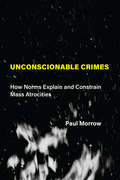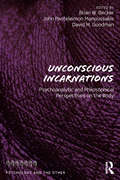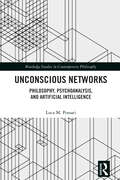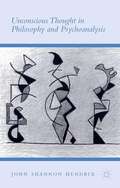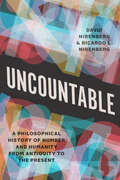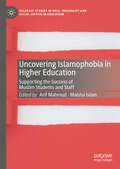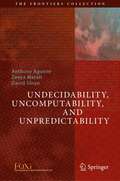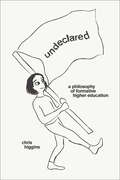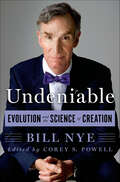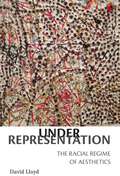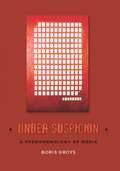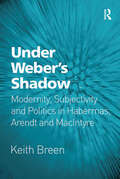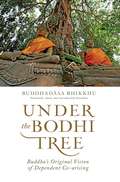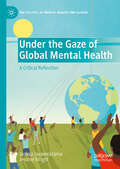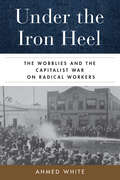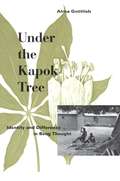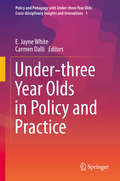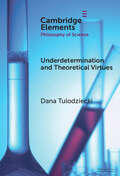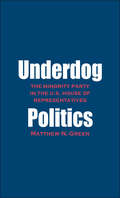- Table View
- List View
Uncommon Happiness
by Marcia Binder Schmidt Dzigar KongtrulFrom 2005 to 2007, teacher Dzigar Kongtrül Rinpoche gave classes on Buddhist scholar Shantideva’s The Way of the Boddhisattva at a noted retreat center in Northern California. His commentaries revealed such a deep understanding that practitioner Marcia Binder Schmidt decided to collect them for other students of Buddhism as an independent work. This book is the result. Beginning with an overview of the entire path of Buddhism, Kongtrül Rinpoche goes on to examine different aspects of Shantideva’s text, always relating the teachings to individual experience. He explores in depth the training of the four immeasurables—equanimity, loving kindness, compassion, and sympathetic joy—and discusses the importance of wholehearted engagement in the process. His advice for setting up and maintaining a spiritual practice is both practical and inspiring. Although the book contains three years of teachings, it remains remarkably compact, reflecting Kongtrül Rinpoche’s characteristic directness and emphasis on implementation. In the words of the editor, “Dharma practice needs to be more than mere theory. Dharma needs to be trained in, integrated into our lives, and embraced by wisdom.” Uncommon Happiness contains the guidance to undergo that training with the right attitude of clarity and commitment.
Uncommon Sense
by Ian ShapiroA spirited defense of the Enlightenment against assaults from both the left and the right that explains its urgent implications for our contemporary politics Ours is an age when optimism about politics is hard to come by. Ian Shapiro explains why this is so and, without minimizing the daunting challenges, spells out an appropriate response. Written in the indomitable spirit exemplified by Tom Paine, Uncommon Sense is a rich source of insight and inspiration in dark political times. The Enlightenment commitments to reason and science are under assault from the Postmodern Left and the Authoritarian Right. Shapiro explains why the attacks are misguided and politically destructive. He agrees with the critics that there are no universal principles of justice that transcend political battles and no fair, impartial rules to govern the distribution of income, wealth, rights, or opportunities. But abandoning the search for them as futile does not mean junking the Enlightenment&’s core political goal: to deploy the tools of reason and science to fight domination. Democracy is essential to vindicating that goal, yet citizens in many democracies are profoundly alienated and many democracies are in danger of failing. Shapiro explains what has gone wrong, debunks ill-considered remedies, and spells out better ones—deepening and extending his previous writing on political theory and democratic politics.
Uncommon Sense: Aesthetics after Marcuse
by Craig LeonardAn examination of Herbert Marcuse&’s political claim for the aesthetic dimension, focusing on defamiliarization as a means of developing radical sensibility.In Uncommon Sense, Craig Leonard argues for the contemporary relevance of the aesthetic theory of Herbert Marcuse—an original member of the Frankfurt School and icon of the New Left—while also acknowledging his philosophical limits. His account reinvigorates Marcuse for contemporary readers, putting his aesthetic theory into dialogue with antiracist and anti-capitalist activism. Leonard emphasizes several key terms not previously analyzed within Marcuse&’s aesthetics, including defamiliarization, anti-art, and habit. In particular, he focuses on the centrality of defamiliarization—a subversion of common sense that can be a means to the development of what Marcuse refers to as &“radical sensibility.&” Leonard brings forward Marcuse&’s claim that the aesthetic dimension is political because of its refusal to operate according to the repressive common sense that establishes and maintains relationships dictated by advanced capitalism. For Marcuse, defamiliarization is at the center of the aesthetic dimension, offering the direct means of stimulating its political potential. Leonard expands upon Marcuse&’s aesthetics by drawing on the work of Sylvia Wynter, going beyond Marcuse&’s predominantly European and patrilineal intellectual framework—while still retaining his aesthetic theory&’s fundamental characteristics—toward a human dimension requiring decolonial, feminist, antiracist, and counterpoetic perspectives.
Uncommon Sense: Jeremy Bentham, Queer Aesthetics, and the Politics of Taste
by Carrie D. ShanafeltInfamous for authoring two concepts since favored by government powers seeking license for ruthlessness—the utilitarian notion of privileging the greatest happiness for the most people and the panopticon—Jeremy Bentham is not commonly associated with political emancipation. But perhaps he should be. In his private manuscripts, Bentham agonized over the injustice of laws prohibiting sexual nonconformity, questioning state policy that would put someone to death merely for enjoying an uncommon pleasure. He identified sources of hatred for sexual nonconformists in philosophy, law, religion, and literature, arguing that his goal of "the greatest happiness" would be impossible as long as authorities dictate whose pleasures can be tolerated and whose must be forbidden. Ultimately, Bentham came to believe that authorities worked to maximize the suffering of women, colonized and enslaved persons, and sexual nonconformists in order to demoralize disenfranchised people and prevent any challenge to power.In Uncommon Sense, Carrie Shanafelt reads Bentham’s sexual nonconformity papers as an argument for the toleration of aesthetic difference as the foundation for egalitarian liberty, shedding new light on eighteenth-century aesthetics and politics. At odds with the common image of Bentham as a dehumanizing calculator or an eccentric projector, this innovative study shows Bentham at his most intimate, outraged by injustice and desperate for the end of sanctioned, discriminatory violence.
Uncommon Wrath: How Caesar and Cato's Deadly Rivalry Destroyed the Roman Republic
by Josiah OsgoodA dual biography of Julius Caesar and Cato the Younger that offers a dire warning: republics collapse when partisanship overrides the common good. In Uncommon Wrath, historian Josiah Osgood tells the story of how the political rivalry between Julius Caesar and Marcus Cato precipitated the end of the Roman Republic. As the champions of two dominant but distinct visions for Rome, Caesar and Cato each represented qualities that had made the Republic strong, but their ideological differences entrenched into enmity and mutual fear. The intensity of their collective factions became a tribal divide, hampering their ability to make good decisions and undermining democratic government. The men&’s toxic polarity meant that despite their shared devotion to the Republic, they pushed it into civil war. Deeply researched and compellingly told, Uncommon Wrath is a groundbreaking biography of two men whose hatred for each other destroyed the world they loved.
Unconditional Equals
by Anne PhillipsWhy equality cannot be conditional on a shared human “nature” but has to be for allFor centuries, ringing declarations about all men being created equal appealed to a shared human nature as the reason to consider ourselves equals. But appeals to natural equality invited gradations of natural difference, and the ambiguity at the heart of “nature” enabled generations to write of people as equal by nature while barely noticing the exclusion of those marked as inferior by their gender, race, or class. Despite what we commonly tell ourselves, these exclusions and gradations continue today. In Unconditional Equals, political philosopher Anne Phillips challenges attempts to justify equality by reference to a shared human nature, arguing that justification turns into conditions and ends up as exclusion. Rejecting the logic of justification, she calls instead for a genuinely unconditional equality.Drawing on political, feminist, and postcolonial theory, Unconditional Equals argues that we should understand equality not as something grounded in shared characteristics but as something people enact when they refuse to be considered inferiors. At a time when the supposedly shared belief in human equality is so patently not shared, the book makes a powerful case for seeing equality as a commitment we make to ourselves and others, and a claim we make on others when they deny us our status as equals.
Unconscionable Crimes: How Norms Explain and Constrain Mass Atrocities
by Paul C. MorrowThe first general theory of the influence of norms--moral, legal and social--on genocide and mass atrocity.How can we explain--and prevent--such large-scale atrocities as the Holocaust? In Unconscionable Crimes, Paul Morrow presents the first general theory of the influence of norms--moral, legal and social--on genocide and mass atrocity. After offering a clear overview of norms and norm transformation, rooted in recent work in moral and political philosophy, Morrow examines numerous twentieth-century cases of mass atrocity, drawing on documentary and testimonial sources to illustrate the influence of norms before, during, and after such crimes.
Unconscious Incarnations: Psychoanalytic and Philosophical Perspectives on the Body (Psychology and the Other)
by John Panteleimon Manoussakis Brian W. Becker David M. GoodmanUnconscious Incarnations considers the status of the body in psychoanalytic theory and practice, bringing Freud and Lacan into conversation with continental philosophy to explore the heterogeneity of embodied life. By doing so, the body is no longer merely an object of scientific inquiry but also a lived body, a source of excessive intuition and affectivity, and a raw animality distinct from mere materiality. The contributors to this volume consist of philosophers, psychoanalytic scholars, and practitioners whose interdisciplinary explorations reformulate traditional psychoanalytic concepts such as trauma, healing, desire, subjectivity, and the unconscious. Collectively, they build toward the conclusion that phenomenologies of embodiment move psychoanalytic theory and practice away from representationalist models and toward an incarnational approach to psychic life. Under such a carnal horizon, trauma manifests as wounds and scars, therapy as touch, subjectivity as bodily boundedness, and the unconscious ‘real’ as an excessive remainder of flesh. Unconscious incarnations signal events where the unsignifiable appears among signifiers, the invisible within the visible, and absence within presence. In sum: where the flesh becomes word and the word retains its flesh. Unconscious Incarnations seeks to evoke this incarnational approach in order to break through tacit taboos toward the body in psychology and psychoanalysis. This interdisciplinary work will appeal greatly to psychoanalysts and psychoanalytic psychotherapists as well as philosophy scholars and clinical psychologists.
Unconscious Networks: Philosophy, Psychoanalysis, and Artificial Intelligence (Routledge Studies in Contemporary Philosophy)
by Luca M. PossatiThis book develops an original theoretical framework for understanding human-technology relations. The author’s approach, which he calls technoanalysis, analyzes artificial intelligence based on Freudian psychoanalysis, biosemiotics, and Latour’s actor-network theory. How can we communicate with AI to determine shared values and objectives? And what, ultimately, do we want from machines? These are crucial questions in our world, where the influence of AI-based technologies is rapidly growing. Unconscious dynamics influence AI and digital technology and understanding them is essential to better controlling AI systems. This book’s unique methodology— which combines psychoanalysis, biosemiotics, and actor-network theory—reveals a radical reformulation of the problem of the human mind. Technoanalysis views the mind as a hybrid network of humans and nonhuman actants in constant interaction with one another. The author argues that human unconscious dynamics influence and shape technology, just as technology influences and shapes human unconscious dynamics. He proceeds to show how this conception of the relationship between the unconscious and technology can be applied to social robotics and AI. Unconscious Networks will appeal to scholars and advanced students interested in philosophy of technology, philosophy of artificial intelligence, psychoanalysis, and science and technology studies.
Unconscious Thought in Philosophy and Psychoanalysis
by John Shannon HendrixUnconscious Thought in Philosophy and Psychoanalysisexplores concepts throughout the history of philosophy that suggest the possibility of unconscious thought and lay the foundation for ideas of unconscious thought in modern philosophy and psychoanalysis. Hendrix considers the workings of unconscious thought, and the role that unconscious thought plays in thinking, language, perception, and human identity. The focus is on the metaphysical and philosophical concepts of unconscious thought, as opposed to the empirical or scientific phenomenon of 'the unconscious', and it is argued that these metaphysical concepts still played an important role in the psychoanalysis of Sigmund Freud and Jacques Lacan. With chapters drawing on a wide range of philosophers from Plotinus to Freud and Lacan,Unconscious Thought in Philosophy and Psychoanalysis casts an original and thought-provoking perspective on the relation between unconscious thought and conscious thought, different kinds of thinking, and the relation between thinking and perceiving.
Uncountable: A Philosophical History of Number and Humanity from Antiquity to the Present
by David Nirenberg Ricardo L. NirenbergRanging from math to literature to philosophy, Uncountable explains how numbers triumphed as the basis of knowledge—and compromise our sense of humanity. Our knowledge of mathematics has structured much of what we think we know about ourselves as individuals and communities, shaping our psychologies, sociologies, and economies. In pursuit of a more predictable and more controllable cosmos, we have extended mathematical insights and methods to more and more aspects of the world. Today those powers are greater than ever, as computation is applied to virtually every aspect of human activity. Yet, in the process, are we losing sight of the human? When we apply mathematics so broadly, what do we gain and what do we lose, and at what risk to humanity? These are the questions that David and Ricardo L. Nirenberg ask in Uncountable, a provocative account of how numerical relations became the cornerstone of human claims to knowledge, truth, and certainty. There is a limit to these number-based claims, they argue, which they set out to explore. The Nirenbergs, father and son, bring together their backgrounds in math, history, literature, religion, and philosophy, interweaving scientific experiments with readings of poems, setting crises in mathematics alongside world wars, and putting medieval Muslim and Buddhist philosophers in conversation with Einstein, Schrödinger, and other giants of modern physics. The result is a powerful lesson in what counts as knowledge and its deepest implications for how we live our lives.
Uncovering Islamophobia in Higher Education: Supporting the Success of Muslim Students and Staff (Palgrave Studies in Race, Inequality and Social Justice in Education)
by Arif Mahmud Maisha IslamThis edited collection documents the experiences of Muslim students and staff in UK higher education (HE), including their expertise and experiences in teaching, scholarship, policy and academic transitions as professionals, academics and students. At a time when UK HE at large is attempting to redress myriad racial and social injustices, this collection highlights how this meaningfully applies to Muslim students and staff who find themselves at the nexus of multiple, intersectional oppressions. The chapters presented, all written by Muslim authors, describe the inequalities faced by students and staff at all levels of their educational and professional journeys, exposing the fluid manifestations of Islamophobia within HE structures and institutions. Critically, the book advocates for hope by offering tools that universities and sector bodies can utilise to tackle challenging and nuanced cycles of inequity. This timely volume is essential reading for students, academics, professional service staff, and policymakers leading on diversity, equity and inclusion research, activity and interventions, or those within the sector who wish for it to become more equitable.
Undecidability, Uncomputability, and Unpredictability (The Frontiers Collection)
by Anthony Aguirre Zeeya Merali David SloanFor a brief time in history, it was possible to imagine that a sufficiently advanced intellect could, given sufficient time and resources, in principle understand how to mathematically prove everything that was true. They could discern what math corresponds to physical laws, and use those laws to predict anything that happens before it happens. That time has passed. Gödel’s undecidability results (the incompleteness theorems), Turing’s proof of non-computable values, the formulation of quantum theory, chaos, and other developments over the past century have shown that there are rigorous arguments limiting what we can prove, compute, and predict. While some connections between these results have come to light, many remain obscure, and the implications are unclear. Are there, for example, real consequences for physics — including quantum mechanics — of undecidability and non-computability? Are there implications for our understanding of the relations between agency, intelligence, mind, and the physical world? This book, based on the winning essays from the annual FQXi competition, contains ten explorations of Undecidability, Uncomputability, and Unpredictability. The contributions abound with connections, implications, and speculations while undertaking rigorous but bold and open-minded investigation of the meaning of these constraints for the physical world, and for us as humans.
Undeclared: A Philosophy of Formative Higher Education
by Chris HigginsAn imaginative tour of the contemporary university as it could be: a place to discover self-knowledge, meaning, and purpose.What if college were not just a means of acquiring credentials, but a place to pursue our formation as whole persons striving to lead lives of meaning and purpose? In Undeclared, Chris Higgins confronts the contemporary university in a bid to reclaim a formative mission for higher education. In a series of searching essays and pointed interludes, Higgins challenges us to acknowledge how far our practices have drifted from our ideals, asking: What would it look like to build a college from the ground up to support self-discovery and personal integration? What does it mean to be a public university, and are there any left? How can the humanities help the job-ified university begin to take vocation seriously?Cutting through the underbrush of received ideas, Higgins follows the insight where it leads, clearing a path from the corporate multiversity to the renaissance in higher education that was Black Mountain College and back again. Along the way, we tour a campus bent on becoming a shopping mall, accompany John Dewey through a midlife crisis, and witness the first "happening.&” Through diverse and grounded philosophical engagements, Undeclared assembles the resources to expand the contemporary educational imagination.
Undeniable: Evolution and the Science of Creation
by Bill NyeThe popular scientist explains the marvels and mysteries of evolution in this “fun to read and easy to absorb” New York Times bestseller (The Washington Post).Evolution is one of the most powerful and important ideas ever developed in the history of science. Every question it raises leads to new answers, new discoveries, and new smarter questions. The science of evolution is as expansive as nature itself. It is also the most meaningful creation story that humans have ever found.—Bill NyeSparked by a controversial debate in February 2014, Bill Nye has set off on an energetic campaign to spread awareness of evolution and the powerful way it shapes our lives. In Undeniable: Evolution and the Science of Creation, he explains why race does not really exist; evaluates the true promise and peril of genetically modified food; reveals how new species are born in a dog kennel and in a London subway; takes a stroll through 4.5 billion years of time; and explores the new search for alien life, including aliens right here on Earth.With infectious enthusiasm, Bill Nye shows that evolution is much more than a rebuttal to creationism; it is an essential way to understand how nature works—and to change the world. It might also help you get a date on a Saturday night.“Mr. Nye writes briskly and accessibly [and] makes an eloquent case for evolution.” —The Wall Street Journal“Nye, known for delivering geeky intel with clarity and charm, takes on one of society’s most hotly debated topics (yes, still).” —Time Out New York
Under Representation: The Racial Regime of Aesthetics
by David LloydUnder Representation shows how the founding texts of aesthetic philosophy ground the racial order of the modern world in our concepts of universality, freedom, and humanity. In taking on the relation of aesthetics to race, Lloyd challenges the absence of sustained thought about race in postcolonial studies, as well as the lack of sustained attention to aesthetics in critical race theory.Late Enlightenment discourse on aesthetic experience proposes a decisive account of the conditions of possibility for universal human subjecthood. The aesthetic forges a powerful “racial regime of representation” whose genealogy runs from enlightenment thinkers like Kant and Schiller to late modernist critics like Adorno and Benjamin. For aesthetic philosophy, representation is not just about depiction of diverse humans or inclusion in political or cultural institutions. It is an activity that undergirds the various spheres of human practice and theory, from the most fundamental acts of perception and reflection to the relation of the subject to the political, the economic, and the social.Representation regulates the distribution of racial identifications along a developmental trajectory: The racialized remain “under representation,” on the threshold of humanity and not yet capable of freedom and civility as aesthetic thought defines those attributes. To ignore the aesthetic is thus to overlook its continuing force in the formation of the racial and political structures down to the present. Across five chapters, Under Representation investigates the aesthetic foundations of modern political subjectivity; race and the sublime; the logic of assimilation and the stereotype; the subaltern critique of representation; and the place of magic and the primitive in modernist concepts of art, aura and representation.Both a genealogy and an account of our present, Under Representation ultimately helps show how a political reading of aesthetics can help us build a racial politics adequate for the problems we face today, one that stakes claims more radical than multicultural demands for representation.
Under Suspicion: A Phenomenology of Media (Columbia Themes in Philosophy, Social Criticism, and the Arts)
by Boris GroysThe public generally regards the media with suspicion and distrust. Therefore, the media's primary concern is to regain that trust through the production of sincerity. Advancing the field of media studies in a truly innovative way, Boris Groys focuses on the media's affect of sincerity and its manufacture of trust to appease skeptics.Groys identifies forms of media sincerity and its effect on politics, culture, society, and conceptions of the self. He relies on different philosophical writings thematizing the gaze of the other, from the theories of Heidegger, Sartre, Mauss, and Bataille to the poststructuralist formulations of Lacan and Derrida. He also considers media "states of exception" and their creation of effects of sincerity—a strategy that feeds the media's predilection for the extraordinary and the sensational, further fueling the public's suspicions. Emphasizing the media's production of emotion over the presentation (or lack thereof) of "facts," Groys launches a timely study boldly challenging the presumed authenticity of the media's worldview.
Under Weber’s Shadow: Modernity, Subjectivity and Politics in Habermas, Arendt and MacIntyre
by Keith BreenUnder Weber's Shadow presents an extended critical evaluation of the social and political thought of Jürgen Habermas, Hannah Arendt and Alasdair MacIntyre. Although hailing from very different philosophical traditions, these theorists all take as their starting-point Max Weber's seminal diagnosis of late modernity, the view that the world-historic processes of rationalization and disenchantment are paradoxical in promising freedom yet threatening servitude under the 'iron cage' of instrumental reason. However, each rejects his pessimistic understanding of the grounds and possibilities of political life, accusing him of complicity in the very realities he sought to resist. Seeking to move beyond Weber's monological view of the self, his subjectivism and his identification of the political with domination, they offer alternative, intersubjective conceptions of the subject, ethics and politics that allow for positive future possibilities. But this incontrovertible gain, it is argued, comes at the cost of depoliticizing key arenas of human endeavour and of neglecting the reality of struggle and contestation. Engaging with important current debates and literature, Keith Breen provides a rigorous analysis of the work of Habermas, Arendt, MacIntyre and Weber and a highly accessible and original intervention within contemporary social and political thought. Under Weber's Shadow will therefore be of interest to students and researchers alike within the areas of social and political theory, as well as those within the disciplines of ethics, sociology and philosophy.
Under the Bodhi Tree: Buddha's Original Vision of Dependent Co-arising
by Ajahn Buddhadasa Bhikkhu SantikaroA renowned Buddhist master digs into the idea of interdependency—the very core of the Buddha’s teachings.Under the Bodhi Tree takes us back to the principles at the heart of Buddha’s teachings—conditionality and dependent co-arising. Ajahn Buddhadasa Bhikkhu makes the case for dependent co-arising as a natural law, and builds a compelling presentation from there of Buddhist philosophy, meditation, and practice. Basing himself squarely on the Buddha’s own words as preserved in the Pali Canon, he brings clarity and simplicity to what is typically a thorny philosophical knot. By returning dependent co-arising to its central place in Buddhist theory and practice, Ajahn Buddhadasa provides perspective on the Buddha’s own insights and awakening. Under the Bodhi Tree is another excellent entry from one of the most renowned Buddhist thinkers of modern times. For students who wish to study further, a companion guide is available from liberationpark.org.
Under the Gaze of Global Mental Health: A Critical Reflection (The Politics of Mental Health and Illness)
by Janaka Jayawickrama Jerome WrightThis book critically examines how the globalisation of mental health through the dominant medical model has created barriers to understanding and responding to distress with reference to cases from Malawi and Sri Lanka. Its authors argue that mental health must be understood within the overall health of an individual, and individual health is located within the social, political, cultural, economic, and environmental context in which they live. Their analyses demonstrate that supplanting locally developed responses to distress with a Western medicalised model of mental health inhibits a meaningful engagement with individuals and communities in need of care. Further, they argue that this &‘supplanting&’ is analogous with a colonial endeavour, and one which diverts attention from the real problems of development. Across contexts the book highlights the difficulties that mental health professionals face in facilitating individuals&’ capacities within structurally damaging socio-economic environments and increasingly commercially orientated health systems. This book will appeal in particular to students, researchers and practitioners working across the fields of mental health, medical anthropology, social work, and health and development studies.
Under the Iron Heel: The Wobblies and the Capitalist War on Radical Workers
by Ahmed WhiteA dramatic, deeply researched account of how legal repression and vigilantism brought down the Wobblies—and how the destruction of their union haunts us to this day. In 1917, the Industrial Workers of the World was rapidly gaining strength and members. Within a decade, this radical union was effectively destroyed, the victim of the most remarkable campaign of legal repression and vigilantism in American history. Under the Iron Heel is the first comprehensive account of this campaign. Founded in 1905, the IWW offered to the millions of workers aggrieved by industrial capitalism the promise of a better world. But its growth, coinciding with World War I and the Russian Revolution and driven by uncompromising militancy, was seen by powerful capitalists and government officials as an existential threat that had to be eliminated. In Under the Iron Heel, Ahmed White documents the torrent of legal persecution and extralegal, sometimes lethal violence that shattered the IWW. In so doing, he reveals the remarkable courage of those who faced this campaign, lays bare the origins of the profoundly unequal and conflicted nation we know today, and uncovers disturbing truths about the law, political repression, and the limits of free speech and association in class society.
Under the Kapok Tree
by Alma GottliebIn this companion volume to Parallel Worlds, Alma Gottlieb explores ideology and social practices among the Beng people of Côte d'Ivoire. Employing symbolic and postmodern perspectives, she highlights the dynamically paired notions of identity and difference, symbolized by the kapok tree planted at the center of every Beng village. "This book merits a number of readings. . . . An experiment in ethnography that future projects might well emulate. " —Clarke K. Speed, American Anthropologist "[An] evocative, rich ethnography. . . . Gottlieb does anthropology a real service. " —Misty L. Bastian, American Ethnologist "Richly detailed. . . . This book offers a nuanced descriptive analysis which commands authority. " —Elizabeth Tonkin, Man "Exemplary. . . . Gottlieb's observations on identity and difference are not confined to rituals or other special occasions; rather she shows that these principles emerge with equal force during daily social life. " —Monni Adams, Journal of African Religion "[An] excellent study. " —John McCall, Journal of Folklore Research
Under-three Year Olds in Policy and Practice (Policy and Pedagogy with Under-three Year Olds: Cross-disciplinary Insights and Innovations)
by Carmen Dalli E. Jayne WhiteThe first book in the series Policy and Pedagogy with Under-three year olds: Cross Disciplinary insights and innovations establishes a path for the much-needed examination of the experiences of infants and toddlers in contemporary educational settings across the globe. Bringing together internationally renowned scholars in the field, it starts a series of discussions about the positioning of under-three year olds in contemporary practice and policy contexts. It takes an in-depth look at what this means for our understanding of under-three year olds and those who share their worlds. Featuring some of the most important contemporary topics in this pedagogical domain, such as care, well-being, belonging, professionalism and status, the contributors offer a kaleidoscope of perspectives for contemplating the new normality of very young children living their lives in group-based early childhood settings, and what gives rise to their current realities. It also explores some important policy directions and trends.
Underdetermination and Theoretical Virtues (Elements in the Philosophy of Science)
by Dana TulodzieckiThis Element advances a novel view – the Epistemic Labour View – about the role, limits, and potential of the theoretical virtues as the arbiters of various versions of underdetermination. A central focus is to go beyond the often abstract discussions in this area and to show how the theoretical virtues can illuminate and resolve issues surrounding actual cases of underdetermination found in scientific practice. This title is also available as Open Access on Cambridge Core.
Underdog Politics
by Matthew N. GreenFollowing its publication in 1974, Grant Gilmore's compact portrait of the development of American law from the eighteenth century to the mid-twentieth century became a classic. In this new edition, the portrait is brought up to date with a new chapter by Philip Bobbitt that surveys the trajectory of American law since the original publication. Bobbitt also provides a Foreword on Gilmore and the celebrated lectures that inspired The Ages of American Law. "Sharp, opinionated, and as pungent as cheddar. "#151;New Republic "This book has the engaging qualities of good table talk among a group of sophisticated and educated friends#151;given body by broad learning and a keen imagination and spiced with wit. "#151;Willard Hurst
